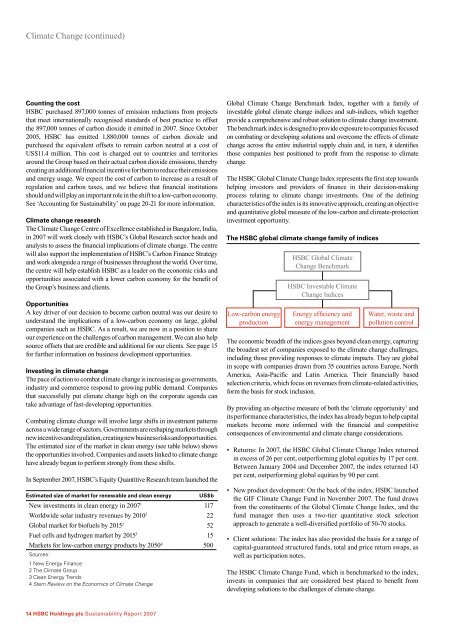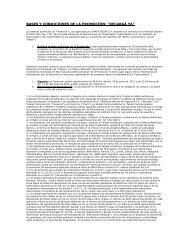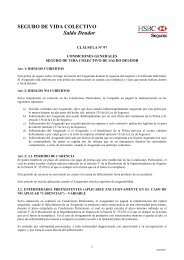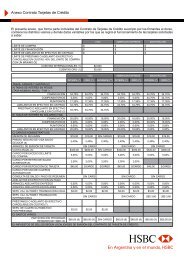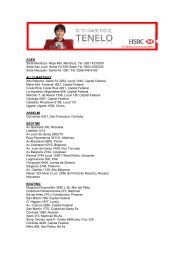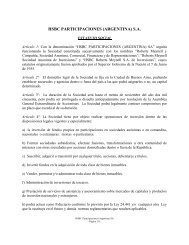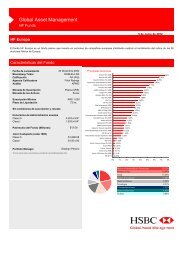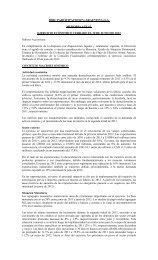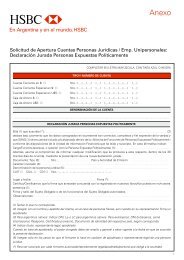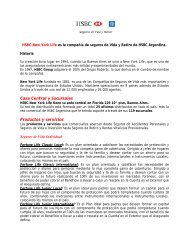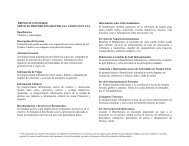HSBC Holdings plc Sustainability Report 2007
HSBC Holdings plc Sustainability Report 2007
HSBC Holdings plc Sustainability Report 2007
Create successful ePaper yourself
Turn your PDF publications into a flip-book with our unique Google optimized e-Paper software.
Climate Change (continued)<br />
Counting the cost<br />
<strong>HSBC</strong> purchased 897,000 tonnes of emission reductions from projects<br />
that meet internationally recognised standards of best practice to offset<br />
the 897,000 tonnes of carbon dioxide it emitted in <strong>2007</strong>. Since October<br />
2005, <strong>HSBC</strong> has emitted 1,880,000 tonnes of carbon dioxide and<br />
purchased the equivalent offsets to remain carbon neutral at a cost of<br />
US$11.4 million. This cost is charged out to countries and territories<br />
around the Group based on their actual carbon dioxide emissions, thereby<br />
creating an additional financial incentive for them to reduce their emissions<br />
and energy usage. We expect the cost of carbon to increase as a result of<br />
regulation and carbon taxes, and we believe that financial institutions<br />
should and will play an important role in the shift to a low-carbon economy.<br />
See ‘Accounting for <strong>Sustainability</strong>’ on page 20-21 for more information.<br />
Climate change research<br />
The Climate Change Centre of Excellence established in Bangalore, India,<br />
in <strong>2007</strong> will work closely with <strong>HSBC</strong>’s Global Research sector heads and<br />
analysts to assess the financial implications of climate change. The centre<br />
will also support the implementation of <strong>HSBC</strong>’s Carbon Finance Strategy<br />
and work alongside a range of businesses throughout the world. Over time,<br />
the centre will help establish <strong>HSBC</strong> as a leader on the economic risks and<br />
opportunities associated with a lower carbon economy for the benefit of<br />
the Group’s business and clients.<br />
Opportunities<br />
A key driver of our decision to become carbon neutral was our desire to<br />
understand the implications of a low-carbon economy on large, global<br />
companies such as <strong>HSBC</strong>. As a result, we are now in a position to share<br />
our experience on the challenges of carbon management. We can also help<br />
source offsets that are credible and additional for our clients. See page 15<br />
for further information on business development opportunities.<br />
Investing in climate change<br />
The pace of action to combat climate change is increasing as governments,<br />
industry and commerce respond to growing public demand. Companies<br />
that successfully put climate change high on the corporate agenda can<br />
take advantage of fast-developing opportunities.<br />
Combating climate change will involve large shifts in investment patterns<br />
across a wide range of sectors. Governments are reshaping markets through<br />
new incentives and regulation, creating new business risks and opportunities.<br />
The estimated size of the market in clean energy (see table below) shows<br />
the opportunities involved. Companies and assets linked to climate change<br />
have already begun to perform strongly from these shifts.<br />
In September <strong>2007</strong>, <strong>HSBC</strong>’s Equity Quantitive Research team launched the<br />
Estimated size of market for renewable and clean energy<br />
New investments in clean energy in <strong>2007</strong> 1 117<br />
Worldwide solar industry revenues by 2010 2 22<br />
Global market for biofuels by 2015 2 52<br />
Fuel cells and hydrogen market by 2015 3 15<br />
Markets for low-carbon energy products by 2050 4 500<br />
Sources:<br />
1 New Energy Finance<br />
2 The Climate Group<br />
3 Clean Energy Trends<br />
4 Stern Review on the Economics of Climate Change<br />
US$b<br />
Global Climate Change Benchmark Index, together with a family of<br />
investable global climate change indices and sub-indices, which together<br />
provide a comprehensive and robust solution to climate change investment.<br />
The benchmark index is designed to provide exposure to companies focused<br />
on combating or developing solutions and overcome the effects of climate<br />
change across the entire industrial supply chain and, in turn, it identifies<br />
those companies best positioned to profit from the response to climate<br />
change.<br />
The <strong>HSBC</strong> Global Climate Change Index represents the first step towards<br />
helping investors and providers of finance in their decision-making<br />
process relating to climate change investments. One of the defining<br />
characteristics of the index is its innovative approach, creating an objective<br />
and quantitative global measure of the low-carbon and climate-protection<br />
investment opportunity.<br />
The <strong>HSBC</strong> global climate change family of indices<br />
Low-carbon energy<br />
production<br />
<strong>HSBC</strong> Global Climate<br />
Change Benchmark<br />
<strong>HSBC</strong> Investable Climate<br />
Change Indices<br />
Energy efficiency and<br />
energy management<br />
Water, waste and<br />
pollution control<br />
The economic breadth of the indices goes beyond clean energy, capturing<br />
the broadest set of companies exposed to the climate change challenges,<br />
including those providing responses to climate impacts. They are global<br />
in scope with companies drawn from 35 countries across Europe, North<br />
America, Asia-Pacific and Latin America. Their financially based<br />
selection criteria, which focus on revenues from climate-related activities,<br />
form the basis for stock inclusion.<br />
By providing an objective measure of both the ‘climate opportunity’ and<br />
its performance characteristics, the index has already begun to help capital<br />
markets become more informed with the financial and competitive<br />
consequences of environmental and climate change considerations.<br />
• Returns: In <strong>2007</strong>, the <strong>HSBC</strong> Global Climate Change Index returned<br />
in excess of 26 per cent, outperforming global equities by 17 per cent.<br />
Between January 2004 and December <strong>2007</strong>, the index returned 143<br />
per cent, outperforming global equities by 90 per cent.<br />
• New product development: On the back of the index, <strong>HSBC</strong> launched<br />
the GIF Climate Change Fund in November <strong>2007</strong>. The fund draws<br />
from the constituents of the Global Climate Change Index, and the<br />
fund manager then uses a two-tier quantitative stock selection<br />
approach to generate a well-diversified portfolio of 50-70 stocks.<br />
• Client solutions: The index has also provided the basis for a range of<br />
capital-guaranteed structured funds, total and price return swaps, as<br />
well as participation notes.<br />
The <strong>HSBC</strong> Climate Change Fund, which is benchmarked to the index,<br />
invests in companies that are considered best placed to benefit from<br />
developing solutions to the challenges of climate change.<br />
14 <strong>HSBC</strong> <strong>Holdings</strong> <strong>plc</strong> <strong>Sustainability</strong> <strong>Report</strong> <strong>2007</strong>


